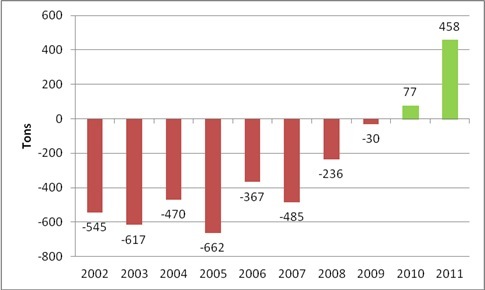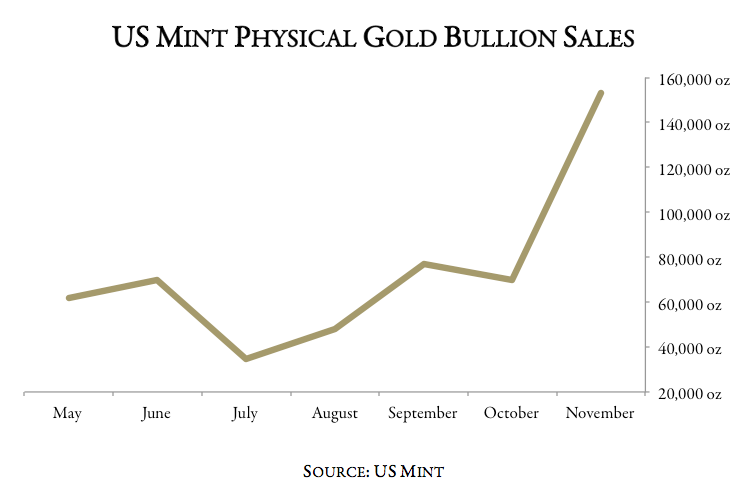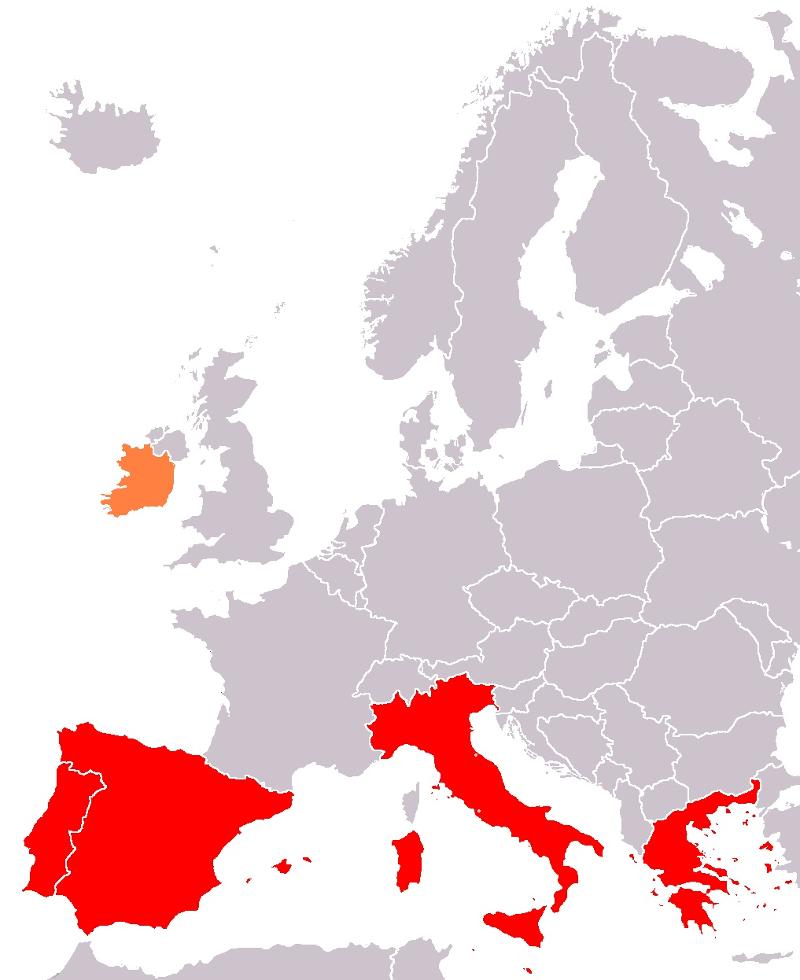Both CNBC and MarketWatch ran articles this week about Peter Schiff’s outlook of where the American economy is headed. CNBC wrote about the international currency war, and Peter’s belief that America will ultimately win, therefore destroying consumer purchasing power and bolstering gold.
By Dickson Buchanan
The Setting: The Bank and Currency Committee, Washington, DC, 1912.
In the Panic of 1907, the stock market fell over 50% in one day and caused massive bank runs. Bailouts had done little to restore confidence. Five years later, all this still lingered palpably in the minds of the crowd packed into the courthouse to listen to the testimony of one of the most powerful men in all of American history. By some considered a hero; by others, a criminal.
His Name: John Pierpont Morgan.
By Peter Schiff
The financial world was shocked this month by a demand from Germany’s Bundesbank to repatriate a large portion of its gold reserves held abroad. By 2020, Germany wants 50% of its total gold reserves back in Frankfurt – including 300 tons from the Federal Reserve. The Bundesbank’s announcement comes just three months after the Fed refused to submit to an audit of its holdings on Germany’s behalf. One cannot help but wonder if the refusal triggered the demand.
Either way, Germany appears to be waking up to a reality for which central banks around the world have been preparing: the dollar is no longer the world’s safe-haven asset and the US government is no longer a trustworthy banker for foreign nations. It looks like their fears are well-grounded, given the Fed’s seeming inability to return what is legally Germany’s gold in a timely manner. Germany is a developed and powerful nation with the second largest gold reserves in the world. If they can’t rely on Washington to keep its promises, who can?
On Friday, CBS MoneyWatch published Peter Schiff’s rebuttal to prominent gold skeptic Larry Swedroe, who had challenged Peter’s precious metals forecasting. Peter writes:
In an article entitled “Ignore the ‘buy gold now’ crowd” on CBS MoneyWatch this Monday, columnist and equities analyst Larry Swedroe criticizes forecasters who remain bullish on gold despite its monumental decade-long run.
He links to an interview in which I forecast that gold will rise above $5,000/oz before this bull market ends. Unsourced, Swedroe modifies my prediction to $2,300/oz by the end of 2013. While I typically forecast overall market direction rather than timing, I’m fairly comfortable with the words Swedroe put in my mouth. I believe gold will continue to rise and close 2013 significantly higher than present levels, and I’m invested accordingly. What I find most disconcerting in Swedroe’s piece is everything that follows. He goes on to question both a) investment forecasting as a practice and b) gold as an asset in general.”
CLICK HERE TO READ THE FULL ARTICLE
Get Peter Schiff’s latest gold market analysis – click here – for a free subscription to his exclusive weekly email updates.
Interested in learning more about physical gold and silver?
Call 1-888-GOLD-160 and speak with a Precious Metals Specialist today!
By Peter Schiff
Everyone knows the investor’s mantra: “buy low, sell high.” Rather than fretting about lower gold prices over the past month, investors should be seizing this golden opportunity to safely store some wealth in precious metals before gold and silver start ratcheting higher again. I’m not the only one anticipating $2,000 and higher gold – experts all over the world are predicting another bullish year for the yellow metal.
By Peter Schiff
With the return of Shinzo Abe and his Liberal Democratic Party to power in Japan, the market for US Treasuries may be losing its last external pillar of support. Re-elected on September 26th, Abe has quickly set a course for limitless inflation, saying Japan must “free itself from deflation and the strong yen.” This is significant to the global economy as Japan is the largest foreign power left with a strong appetite for US Treasuries. If this demand falters, the Fed may be the only remaining buyer of new Treasury issuance.
Abe’s Plan
This election marks Abe’s second turn in the premier’s seat. He first held the position from 2006 to 2007, when he abruptly resigned as the first of a string of unpopular one-year premierships. Notably, in the intervening time, the LDP lost its lower house majority to an opposition party for the first time since its formation in 1955. The victors, the Democratic Party of Japan, had been formed in 1998 on a platform of reducing corruption and making Japan more progressive.
By Valentin Petkantchin
You may be among those investors who had the opportunity, but did not seize it, to buy gold cheap in the early 2000s. You may also be willing, but hesitant, to do so at current prices, while still desiring the “anti-crash insurance” it represents.
However, you should be aware that the yellow metal is increasingly valued as a reserve asset, which will tend to push the price up, independently of all other factors. Due to new regulations, you may also have to bid in the future alongside financial institutions, including several banks, to acquire it.
First, let’s take a step back, at least as it regards central banks’ attitude towards gold. The fact is that it has considerably changed. Central banks, which had sold gold for decades, have become – for the “first time in 21 years”, dixit the World Gold Council – net buyers in 2010, i.e. the total quantities purchased by them have exceeded the quantities sold.
By Peter Schiff
Turn on the TV and this is what you’ll hear: The US budget is heading for a fiscal cliff. If a deal isn’t reaching in Congress by the end of this year, a combination of automatic tax hikes and budget cuts will sink America into economic depression. There is no escape.
Of course, my readers know that the fiscal cliff is merely an example of the piper having to be paid. The problem isn’t the bill, but that we ran it up so high in the first place. Any deal to avoid the cliff by borrowing even more money may allow the piper to keep playing a while longer, but when the music finally stops, the next fiscal cliff will be that much larger.
My readers also know that there are several ways for investors to avoid the cliff altogether. Perhaps the most secure is buying precious metals. However, given what we know, it may seem confusing that the spot prices of gold and silver have been moving sideways.
However, these headline prices have largely concealed a more important indicator: physical bullion sales are booming.
By J. Luis Martin
Although the eurozone crisis did not make it into the US presidential debate on foreign policy in October, Treasury Secretary Timothy Geithner did remark earlier in the month: “We are very worried about the risk of collapse in Europe.” Indeed, he should be, for a collapse of the euro would not only send shockwaves through the already fragile world economy, but would also undermine America’s own escape strategy of currency debasement. This makes preservation of the status-quo in Europe an essential part of the United States’ plan to avert its so-called fiscal cliff – even if it means that Washington has to increase its exposure to the faltering economies across the pond.
By Peter Schiff
If no one seems to care that the Titanic is filling with water, why not drill another hole in it? That seems to be the M.O. of the Bernanke Federal Reserve. After the announcement of QE3 (also dubbed “QE Infinity”) created yet another round of media chatter about a recovery, the Fed’s Open Market Committee has decided to push infinity a little bit further. The latest move involves the continuing purchase of long-term Treasuries when Operation Twist expires, thereby more than doubling QE3 to a monthly influx of $85 billion in phony money starting in December. I call it “QE3 Plus” – now with more inflation!
Inflation By Any Other Name
In case you’ve lost track of all the different ways the Fed has connived to distort the economy, here’s a refresher on Operation Twist: the Fed sells Treasury notes with maturity dates of three years or less, and uses the cash to buy long-term Treasury bonds. This “twisting” of its portfolio is supposed to bring down long-term interest rates to make the US economy appear stronger and inflation appear lower than is actually the case.






